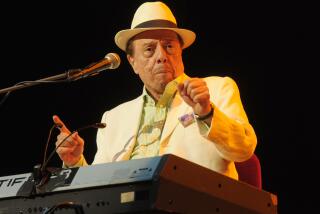Brazil Gets ‘Biggest Happiness’
- Share via
RIO DE JANEIRO — They danced and they sang, they prayed and shouted obscenities at their television screens here and across Brazil, where soccer is something between a sport and a religion.
Finally, after 67 agonizing minutes, their team scored a goal. And then another. When the final whistle blew, everything was as it should be: Brazilians were lifting the World Cup trophy.
“Brazil had to win, it couldn’t be any other way,” said Luiz Carlos Cavalcante, a nightclub singer who joined about 2,000 people celebrating on the sands of Rio’s Copacabana beach. “This is the biggest happiness in the world for us.”
After the victory, people jammed town squares and streets in every corner of this country to celebrate. About 50,000 Brazilians cheered shoulder to shoulder across the wide expanse of Avenida Paulista in Sao Paulo, South America’s largest city. And more than 100,000 people converged on Ramos Plaza in the center of Belem, at the mouth of the Amazon River.
Perhaps nowhere on Earth is a nation’s identity as linked to a sport as Brazil’s is to soccer. So it came as little surprise that President Fernando Henrique Cardoso praised the victory Sunday as proof of the strength of the Brazilian character. And proof, too, that Brazil has the right stuff to reverse its declining economy.
“The whole world saw the courage of the Brazilian people. They saw we are capable of organizing ourselves and winning,” said Cardoso, who watched the game in Brasilia, the nation’s capital. “And they will see the same thing in the economy. We can organize our home affairs and triumph there as well.”
In recent weeks, Brazil’s national currency, the real, has dipped in value, and financial markets have suffered precipitous declines. Before the World Cup competition started in late May, the prevailing pessimism made people here doubt that their team could come out on top.
Then the squad attained a string of victories and made the final. Brazilians dared to dream of winning the penta, or fifth World Cup championship. Ronaldo, the team’s star striker, had become a symbol of national renewal and hope, returning to lead the team after being sidelined for the better part of two years with knee injuries.
Even the usually staid Rio newspaper Jornal do Brasil got caught up in the excitement. A front-page banner headline proclaimed Sunday “The Most Awaited Day of the Century.”
Most Brazilians expected their team to beat the Germans. But many also harbored fears of a terrible defeat, like the one Brazil suffered in the World Cup final in 1998, when Ronaldo contracted a mysterious illness the day of the game. That loss helped prompt a slew of conspiracy theories and congressional hearings on the decline of Brazilian soccer.
“All of us know that, for Brazil, to finish second is to finish last,” said the team’s coach, Luiz Felipe “Big Phil” Scolari.
In the hours before the game kicked off, legions of Brazilian reporters and analysts picked apart every detail of the team’s preparations, including Ronaldo’s strange crescent-moon haircut.
“All 174 million Brazilians are anxious. There is a tremendous sense of expectation,” said Mario Zagallo, who won four World Cups as a player and coach. Zagallo said he had little doubt Brazil would triumph this time too. “The technique, the determination and the art of Brazil” would win out, he said.
Most here shared that hope.
“Soccer is a language that you speak in Brazilian,” said Alberto Massad, a 31-year-old fireman who joined the crowd watching the game on a big-screen television on Copacabana beach.
The crowd had begun forming before dawn on what would soon become a sultry June day. A group of drummers tapped out a samba beat as the game kicked off at 8 a.m. But the mood turned tense and quiet as the minutes ticked off without a Brazilian goal.
At halftime, one group of women sat on the curb, clasping hands, weeping and praying, while others worked off the tension by dancing with a shuffle on the sand-covered sidewalk that runs along the beach.
“I can’t even watch. It’s too stressful,” said Eugenia Abrahao, a Portuguese teacher.
After Brazil scored and the clock ticked down to victory, the tension gave way to songs and chants.
“There are so many people in this country who can’t buy food, who can’t buy a shirt,” said Ediluna Gomes, a hairstylist. “This is their reward,” she said, looking up at the screen, where the Brazilian team was taking a victory lap.
The celebrations lasted well into the night throughout Brazil, sounding a note of unity in an ethnically diverse and often conflicted country.
In the Coroa Vermelha reserve in the northeastern state of Bahia, native Pataxo Indians swapped their usual red tribal paint for the green and yellow of the Brazilian flag.
“We are descendants of the Indians, of the first Brazilians who were found here,” Capim Bara, a Pataxo tribesman, told the Reuters news service. “Our country has fought, and now we won.”
Expatriate Brazilians in Portugal and Italy also took to the streets. But in Bolivia, the celebrations were muted. At least three dozen Brazilians were arrested in the Bolivian city of Cochabamba. They had forgotten it was election day in that country, and all public demonstrations were prohibited by law.







